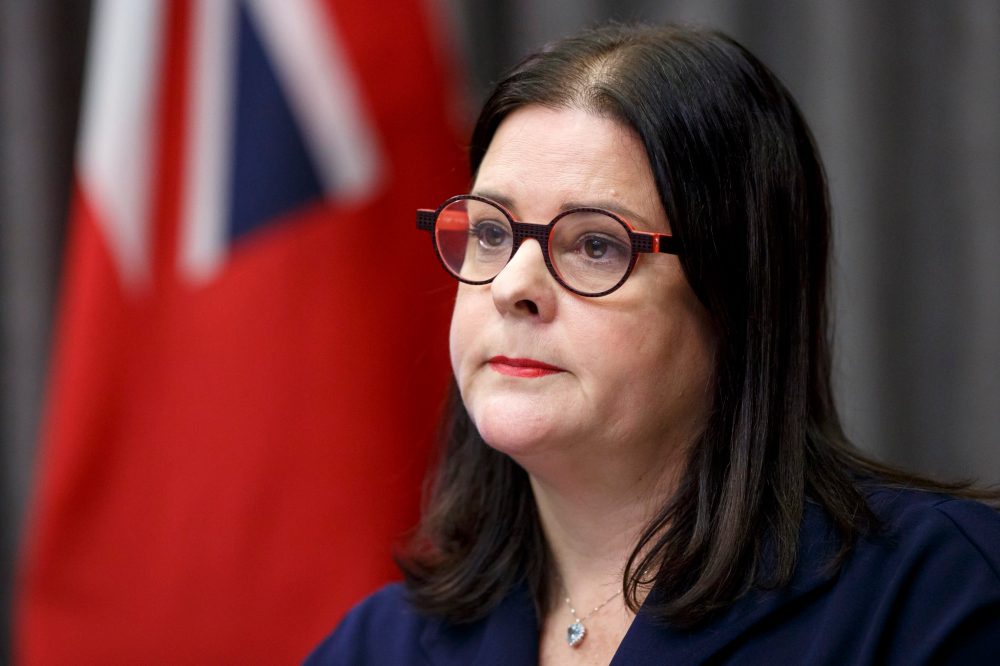Doctors call for political reckoning amid health-care crisis
Advertisement
Read this article for free:
or
Already have an account? Log in here »
To continue reading, please subscribe:
Monthly Digital Subscription
$0 for the first 4 weeks*
- Enjoy unlimited reading on winnipegfreepress.com
- Read the E-Edition, our digital replica newspaper
- Access News Break, our award-winning app
- Play interactive puzzles
*No charge for 4 weeks then price increases to the regular rate of $19.00 plus GST every four weeks. Offer available to new and qualified returning subscribers only. Cancel any time.
Monthly Digital Subscription
$4.75/week*
- Enjoy unlimited reading on winnipegfreepress.com
- Read the E-Edition, our digital replica newspaper
- Access News Break, our award-winning app
- Play interactive puzzles
*Billed as $19 plus GST every four weeks. Cancel any time.
To continue reading, please subscribe:
Add Free Press access to your Brandon Sun subscription for only an additional
$1 for the first 4 weeks*
*Your next subscription payment will increase by $1.00 and you will be charged $16.99 plus GST for four weeks. After four weeks, your payment will increase to $23.99 plus GST every four weeks.
Read unlimited articles for free today:
or
Already have an account? Log in here »
Hey there, time traveller!
This article was published 16/01/2022 (1424 days ago), so information in it may no longer be current.
Calls for a pandemic reckoning are getting louder as Manitoba’s health-care system collapses under unprecedented patient volumes.
After Premier Heather Stefanson urged Manitobans to look after themselves this week and called for “a balanced approach” to implementing public-health advice, front-line physicians and officials representing thousands of health-care workers across the province are demanding accountability for decision-making amid the ongoing crisis.
“It is clear that the health-care system is failing. It is an absolute disgrace,” said cardiac ICU physician Dr. Eric Jacobsohn, who has been among a group of senior doctors writing open letters calling for change.

“In the end, when we’re done this, there has to be a look back and an accounting for not listening to advice.”
Advocates and unions have been raising alarms about staff shortages for years, from nurses to paramedics to social workers, respiratory therapists and other in-hospital workers and front-line staff and they feel their input has been consistently ignored.
“When we’re talking about, will there need to be a reckoning or an accounting of how this was handled, I guarantee that our members will be demanding accountability when it’s all over, but the more important piece right now is we need help,” said Bob Moroz, president of the Manitoba Association of Health Care Professionals, which represents 6,500 members. Moroz said he hears from staff daily who are disillusioned and ignored by government and their employers.
“It is psychologically harmful,” he said.
“We cannot be ignored anymore…. the health-care system will continue to collapse if the premier continues to ignore what allied health professionals are going through right now.”
A problem throughout Manitoba’s pandemic response has been that public health advice is not being processed holistically, “through a whole-of-government, whole-of-society perspective,” said Jack Lindsay, associate professor in Brandon University’s Applied Disaster and Emergency Studies department.
That’s something emergency services personnel would normally do — gather advice from experts and put it into a larger context before it’s implemented. He said there’s typically a limited window of opportunity in the aftermath of a disaster when there’s enough public attention and political will to change — but that window closes quickly, usually casting reflections on what could have been worse instead of what could be better.
It’s a “bad habit” to draw comparisons to worst-case scenarios in hindsight rather than doing the work to improve, Lindsay said. He said Manitoba needs to commit to properly resourcing not only public health and the health-care system, but emergency management.
“This is a symptom of a much bigger problem within our society and government, and we’re just seeing it because the pandemic’s brought it to the forefront, but the end of the pandemic won’t be the end of this larger problem about under-resourcing how we deal with these kinds of crises. And we’re going to see more of them, so we should get on to it.”
Last Wednesday, the premier spoke about shifting the province’s pandemic response to focus on “how we’re going to live with this virus.”
“I think what’s important is that Manitobans look after themselves. I mean, this virus is running throughout our community and it’s up to Manitobans to look after themselves,” Stefanson said. She later added, “The government can’t protect everybody out there. People have to learn to protect themselves. We have to learn to live with this.”
Doctors Manitoba President Dr. Kristjan Thompson held a news conference the following day to say individualism is not the way out of the pandemic, and that doctors “will not abandon you.”
“Part of us dealing with this pandemic has been a lot of Band-Aid solutions, moving people around. I really do hope, though, that we learn from this… and we deal with the deep-rooted systemic causes that has led to this lack of ‘surge’ in surge capacity,” Thompson said.
“It’s not just what we do today. It’s learning from this and ensuring that we address these systemic issues so that this doesn’t happen again.”
katie.may@winnipegfreepress.com

Katie May is a general-assignment reporter for the Free Press.
Our newsroom depends on a growing audience of readers to power our journalism. If you are not a paid reader, please consider becoming a subscriber.
Our newsroom depends on its audience of readers to power our journalism. Thank you for your support.



